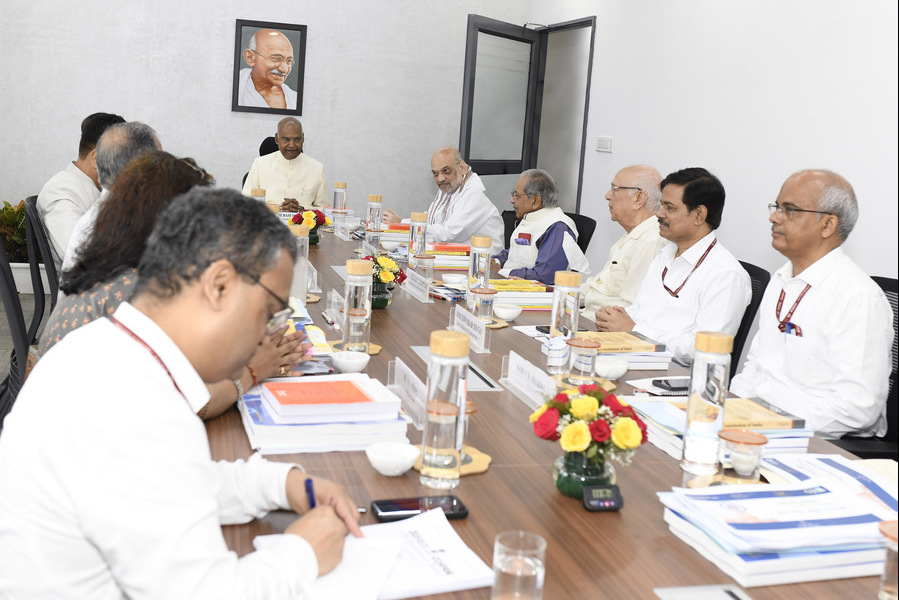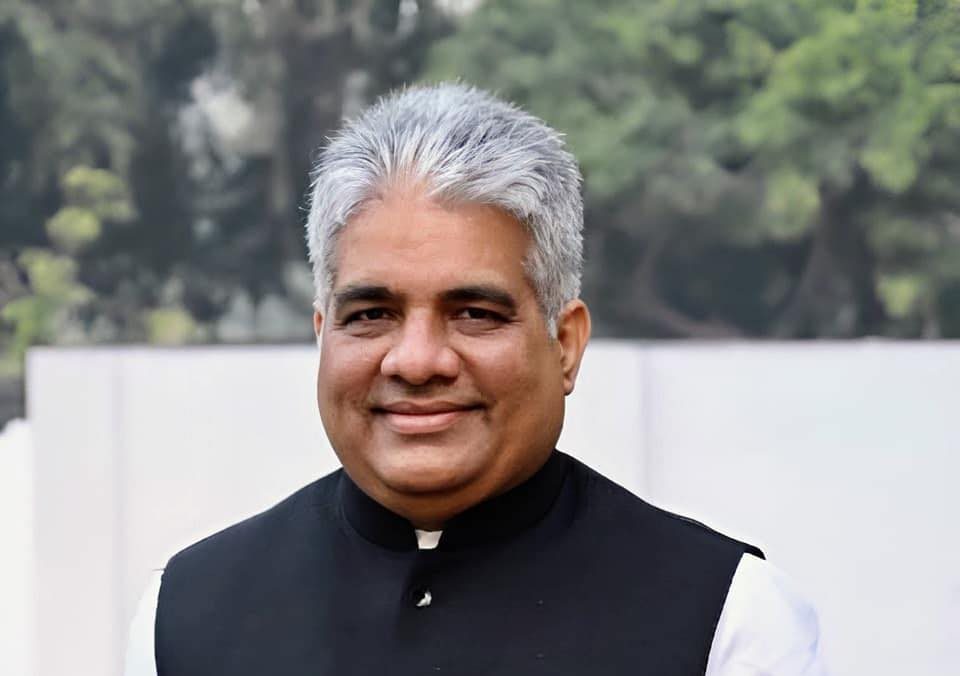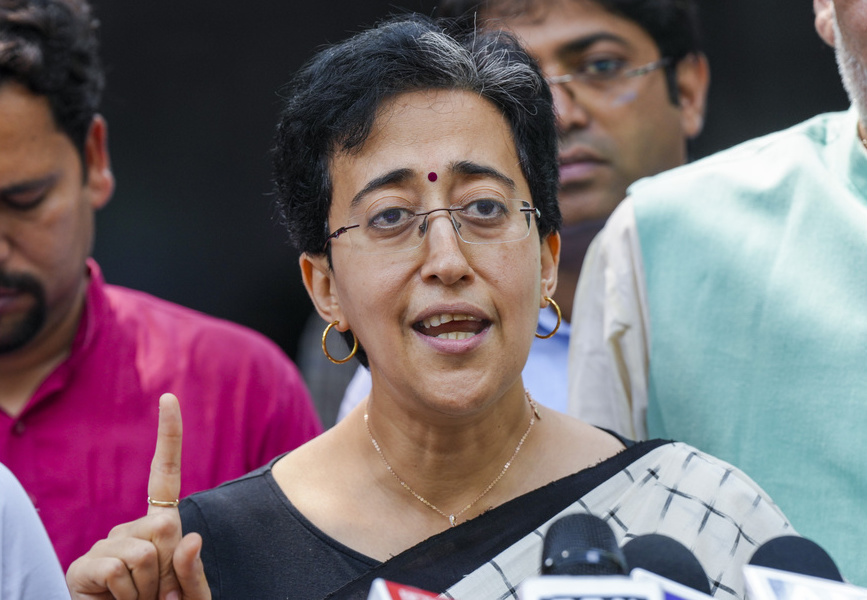New Delhi, Sept 18: Moving ahead with its “one nation, one election” plan, the government on Wednesday accepted a high-level panel’s recommendations for holding simultaneous polls for the Lok Sabha, state assemblies and local bodies in a phased manner after a countrywide consensus-building exercise.
Asserting that several political parties are already on board, the government said even those parties that are opposed to it may now feel pressure from within to change their stand due to the widespread support on the issue from the people of the country.
Announcing the Union Cabinet’s approval to the proposal, Information and Broadcasting Minister Ashwini Vaishnaw said an implementation group would be formed to take forward the recommendations of the panel headed by former president Ram Nath Kovind and detailed discussions would be held on various fora across the country over the next few months.
Asked by reporters when the recommendations could be implemented and whether a bill would be brought in the upcoming winter session of Parliament, Vaishnaw evaded a direct reply but pointed out that Union Home Minister Amit Shah has said the government would implement it in its current tenure.
After the discussions are completed, implementation would follow in steps and it would be the government’s endeavour to build a consensus over the next few months, he said.
Once the consultation process is over, the government will draft a bill, place it before the cabinet and subsequently, take it to Parliament for simultaneous polls to come into effect, he added.
In its report submitted to the government in March, just before the general election was announced, the panel recommended implementing “one nation, one election” in two phases — simultaneous polls for the Lok Sabha and state assemblies in the first phase and elections for local bodies like panchayats and municipal bodies within 100 days of the general election in the second phase.
It also recommended a common electoral roll, which would need coordination between the Election Commission of India (ECI) and state election commissions.
At present, the ECI is responsible for the Lok Sabha and Assembly polls, while the local body elections for municipalities and panchayats are managed by the state election commissions.
The panel has recommended a total of 18 constitutional amendments, most of which will not need ratification by state Assemblies. However, these would require certain Constitution amendment bills that would have to be passed by Parliament.
Some proposed changes regarding the single electoral roll and single voter ID card would need ratification by at least half of the states.
Separately, the Law Commission is also likely to come up soon with its own report on simultaneous polls, of which Prime Minister Narendra Modi has been a strong votary.
Sources said the Law Commission is likely to recommend holding simultaneous polls for all three tiers of the government — the Lok Sabha, state Assemblies and local bodies like municipalities and panchayats — starting 2029 and a provision for a unity government in cases like a hung house.
The country had simultaneous elections between 1951 and 1967 but thereafter, polls started getting dispersed due to various reasons, including mid-term elections.
Holding all polls simultaneously will require a lot of manoeuvring, including advancing some elections and delaying some others.
While the Lok Sabha polls were held in May-June this year, states like Odisha, Andhra Pradesh, Sikkim and Arunachal Pradesh also went to polls along with the parliamentary election.
The Assembly election process for Jammu and Kashmir and Haryana is currently underway, while Maharashtra and Jharkhand are also scheduled to go to polls later this year.
Delhi and Bihar are among the states that are scheduled to go to polls in 2025.
The terms of the current assemblies in Assam, Kerala, Tamil Nadu, West Bengal, and Puducherry will end in 2026, while the terms of the Goa, Gujarat, Manipur, Punjab, Uttar Pradesh and Uttarakhand assemblies will end in 2027.
The terms of the state assemblies in Himachal Pradesh, Meghalaya, Nagaland, Tripura and Telangana will end in 2028.
The terms of the current Lok Sabha and the state assemblies that went to polls together this year will end in 2029.
‘One nation, one election’ not practical’ : Kharge
The Congress on Wednesday said ‘one nation, one election’ is not practical and alleged that the BJP comes up with such things to divert attention from real issues when elections approach.
Congress president Mallikarjun Kharge made the assertion as the Union Cabinet approved the proposal for ‘one nation, one election’ as recommended by the Kovind panel.
The panel headed by former president Ram Nath Kovind had submitted the report in March ahead of the announcement of Lok Sabha elections. Union minister Ashwini Vaishnaw said the report was approved unanimously by the Cabinet.
Asked about the issue, Kharge said at a press conference here, “It is not practical. It will not work. When elections come, and they are not getting any issues to raise, then they divert attention from real issues.”
Senior Congress leader T S Singhdeo said, “It is only a strategy of political convenience, and what I can see is nothing beyond that. The same party which is governing the country as part of the NDA has been talking about this for the past few years.”
“You see their intent. Had they really been proponent of this view that this will be a great benefit to the country and the society…what attempt did they make to ensure that Jammu and Kashmir, Haryana, Maharashtra and Jharkhand elections take place at the same time,” he said.
Senior Congress leader Harish Rawat said the BJP has realised that they will lose elections in Haryana, Jammu and Kashmir, Maharashtra and Jharkhand.
“After losing one state after another, the BJP was not in a position to sustain that pressure that would’ve resulted in collapse of their coalition government. That’s why the rattled government has opted for ‘one nation, one election’ formula,” he said.
BJP’s ‘cheap stunt’: Derek O’Brien
Senior TMC MP Derek O’Brien on Wednesday claimed that the one nation, one election issue is just “another cheap stunt” of the BJP.
His remarks came after the report of the high-level committee on ‘one nation, one election’ was accepted by the Union cabinet.
“One Nation, One Election is just another cheap stunt from the anti-democratic BJP. Why were Maharashtra elections not announced along with elections in Haryana and Jammu & Kashmir? Here’s why. The Maharashtra government announced the Ladki Bahin scheme in the budget this June,” he said in a statement.
Under the Ladki Bahin scheme, Rs 4,887 crore have been credited to the bank accounts of 1.59 crore women so far, the Maharashtra government said earlier this month.
“The first tranche reached the bank accounts of women in August and the second tranche will reach beneficiaries in October,” O’Brien said.
The TMC’s Leader of Rajya Sabha said the BJP government at the Centre cannot organise elections in three states at one go but talks about ‘one nation, one election’.
“And also tell us, how many constitutional amendments, including curtailing or extending terms of state assemblies, will be done! Classic Modi-Shah Jumla,” he said.
BJP wants one party to rule: Jharkhand CM
Criticising the proposal for ‘one nation, one election’, Jharkhand Chief Minister Hemant Soren on Wednesday alleged that the BJP wanted only one party to rule the country as well as the states.
His remarks came soon after the Union Cabinet approved the proposal for ‘one nation, one election’.
Addressing a government function in Jamtara district, he said, “I just came to know that the Union Cabinet approved the proposal for ‘one nation, one election’. Now, they (BJP) want only one party to rule this country and only one government in place… be it the country or the states. There will be no other government.”
“These people, who disrupt communal harmony, always want to rule,” he added.
The Union Cabinet on Wednesday approved the proposal for ‘one nation, one election’ as recommended by a panel headed by former president Ram Nath Kovind, Union minister Ashwini Vaishnaw said.
The high-level committee had recommended simultaneous elections for the Lok Sabha and state assemblies as the first step followed by synchronised local body polls within 100 days.
The panel had also proposed setting up of an ‘Implementation Group’ to look into the execution of the recommendations made by the committee.
It also recommended the preparation of a common electoral roll and voter ID cards by the Election Commission of India in consultation with state election authorities. (PTI)




